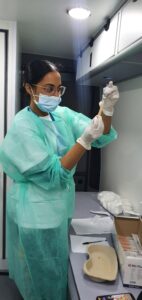 Refugees, asylum seekers, and undocumented migrants are at increased risk of exposure to covid-19 and associated morbidity and mortality, but are more likely to experience barriers to covid-19 vaccine uptake than the general public. If herd immunity to the virus is to be achieved through vaccination it is imperative that the vaccine is accessible to everyone currently eligible to receive it. This requires an inclusive vaccine programme and associated campaigns. While it is crucial to address unequal access in a vaccine rollout programme, in order to increase vaccine uptake among precarious migrants, it is also necessary to inspire confidence in the vaccine and the system and in the personnel delivering it.
Refugees, asylum seekers, and undocumented migrants are at increased risk of exposure to covid-19 and associated morbidity and mortality, but are more likely to experience barriers to covid-19 vaccine uptake than the general public. If herd immunity to the virus is to be achieved through vaccination it is imperative that the vaccine is accessible to everyone currently eligible to receive it. This requires an inclusive vaccine programme and associated campaigns. While it is crucial to address unequal access in a vaccine rollout programme, in order to increase vaccine uptake among precarious migrants, it is also necessary to inspire confidence in the vaccine and the system and in the personnel delivering it.
In May 2021, Doctors of the World UK and Bevan Healthcare CIC carried out semi-structured interviews, a focus group, and written surveys with migrants in vulnerable circumstances and organisations who support them to understand the barriers and facilitators to vaccine confidence.
Many people identified family and friends in the UK and their home countries as the most common source of covid-19 vaccine information. Discouraging information shared on social media and on messaging Apps, and public opposition to the vaccine by faith leaders were cited as significant deterrents to vaccination. Lack of access to reliable information in an appropriate language and formats allowed misinformation to spread unchallenged.
Safety concerns among this migrant population mirrored those expressed by the general public: worries about the rapidity of vaccine development; lack of long-term safety data; and side effects, including the potential impact on fertility and pregnancy and the risk of blood clots. Concerns were voiced about vaccine ingredients including foetal material, pork, alcohol, DNA, and tracking chips. It was said that available information on vaccines does not address subpopulation beliefs and concerns.
Interviews and survey responses highlighted distrust in the vaccine and the systems and organisations responsible for its rollout and delivery. Distrust was often rooted in historical and current injustices against marginalised communities. A common theme was concern that targeted vaccine promotion in Black, Asian and Minority Ethnic groups had racist motivations with associated fears that non-White people would receive different vaccines with harmful outcomes. The Hostile Environment has led to migrant uncertainty about free entitlement to the vaccine and a fear of data sharing of personal information collected for vaccination with the Home Office for immigration control purposes.
Some migrants were hesitant to have the vaccine as they believed their young age meant that the risks of having the vaccine outweighed the benefits; others believed they had adequate natural immunity from having had the virus; and some doubted the vaccine effectiveness as (at the time) vaccinated people were still expected to wear masks and adhere to the same covid-19 guidance as unvaccinated individuals. For others, not accessing the vaccine was a consequence of more pressing life priorities e.g. housing, asylum applications, and finances.
The following facilitators of increased covid-19 vaccine confidence uptake were identified by participants:
- Reliable covid-19 vaccine information endorsed and shared by trusted organisations and individuals.
- Opportunity to ask a health professional questions and discuss vaccine related concerns.
- Access to covid-19 information resources that account for language and literacy needs and in a variety of formats including infographics and sharable videos.
- Targeted webinars and public information sessions.
- Accessible pop-up vaccination clinics in the local community.
- Informed peers and community and religious leaders championing the covid-19 vaccine and sharing their experiences of vaccination.
- Involvement of local voluntary, community and social enterprise (VCSE) organisations working with migrant communities in local vaccination campaigns and service delivery.
- Communications that directly address misinformation circulating on social media.
- Reassurance that data collected for vaccination purposes will not be shared with the Home Office for immigration enforcement.
Access to reliable information about covid-19 and the vaccine from trusted sources enables individuals to make informed choices and would increase vaccine confidence in precarious migrant communities. Personnel responsible for covid-19 vaccine promotion, roll-out and delivery need to work in partnership with communities and VCSE organisations supporting socially-excluded populations to ensure effective covid-19 vaccine messaging and accessible vaccine services.
Doctors of the World UK has developed a Vaccine Confidence Toolkit informed by these findings.
Amy Stevens is a public health specialty registrar with the Yorkshire and the Humber Deanery currently working with Doctors of the World UK and Bevan Healthcare CIC. She has a special interest in migrant and child health and health inequalities.
Twitter: @AmyJStevens1
Competing interests: none declared.
Matteo Besana is the COVID-19 Advocacy Project Lead at Doctors of the World UK working to make COVID-19 services available to everybody regardless of their immigration status or personal circumstances. A journalist by training he is motivated by making the UK a more welcoming place.
Twitter: @matteo_besana
Competing interests: none declared.
Claire van Nispen tot Pannerden currently works as the Women and Children’s Project lead at Doctors of the World UK and as Infectious Diseases specialist for the NHS. She has a special interest in infectious diseases and health and gender inequalities.
Competing interests: none declared.
Fatima Sheik is a GP with a special interest in health inequality. She was the Vaccine Confidence Project Lead and Outreach Coordinator for Doctors of the World UK. She currently works as a GP Rural Fellow in the Highlands.
Twitter: @DrFatimaSheik
Competing interests: none declared.
